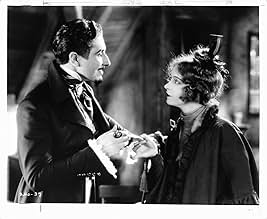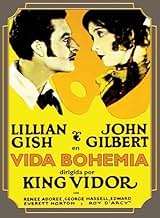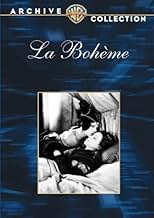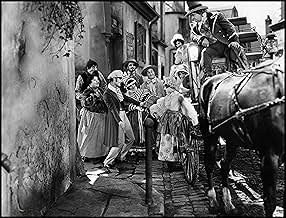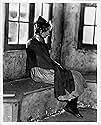IMDb-BEWERTUNG
7,2/10
1740
IHRE BEWERTUNG
Füge eine Handlung in deiner Sprache hinzuA group of starving artists try to survive in 1830s Paris, including a seamstress and the would-be playwright she loves.A group of starving artists try to survive in 1830s Paris, including a seamstress and the would-be playwright she loves.A group of starving artists try to survive in 1830s Paris, including a seamstress and the would-be playwright she loves.
- Auszeichnungen
- 2 wins total
Mathilde Comont
- Madame Benoit
- (as Matilde Comont)
Eugene Pouyet
- Bernard
- (as Gene Pouyet)
Agostino Borgato
- Editor
- (Nicht genannt)
Harry Crocker
- Bit Part
- (Nicht genannt)
Blanche Payson
- Factory Supervisor
- (Nicht genannt)
Empfohlene Bewertungen
NO, this silent Gish/Gilbert version of "La Boheme" is NOT BASED on the Puccini opera. Gish and the studio could not obtain the rights to the Puccini material. It IS based on Henry Murgi's 1851 novel "Life in the Latin Quarter." And once again IMDb insists I must pad out my comment to meet their silly minimum guidelines.
I do agree with other posters than you cannot view silent and sound films in the same way. No matter how great the performers involved, the 'mime' aspects seem very unnatural to modern eyes. You have to set aside prejudices on technique, especially if you are unused to viewing silent films, which can often seem melodrama and corny. I do enjoy watching Gish though.
I do agree with other posters than you cannot view silent and sound films in the same way. No matter how great the performers involved, the 'mime' aspects seem very unnatural to modern eyes. You have to set aside prejudices on technique, especially if you are unused to viewing silent films, which can often seem melodrama and corny. I do enjoy watching Gish though.
In 19th century Bohemia, artistic residents in the "Latin Quarter" of Paris suffer and starve. Lillian Gish (as Mimi) is a seamstress who can't pay the rent. John Gilbert (as Rodolphe) is an playwright with money problems of his own. Gilbert has been watching Gish, who lives in the neighboring attic apartment; he is taken by her innocent waif-like beauty. On the first of the month, neither Ms. Gish nor Mr. Gilbert are able to pay the rent, when the landlord visits. Gilbert, his roommates, and friends get some cash together; but Gish, a loner, is evicted. As Gish is preparing to leave the building, Gilbert and friends rescue her from street life. Then, Gish and Gilbert fall in love.
The film is most notable for its outstanding pairing of stars Gish and Gilbert, under the star direction of King Vidor. Mr. Vidor is strangely subdued by the period, and settings; but, his Paris street scenes are terrific. The meeting of Gish and lecherous Roy D'Arcy (as Vicomte Paul) is striking; and, Gish's tubercular crawl through the streets of Paris is most especially stunning.
The lovers of "La Bohème" face poverty and misunderstanding; but, mainly, it's Gish's "Mimi" making sacrifices for Gilbert's "Rodolphe". Gish's performance is indescribable. According to Vidor and co-workers, she may have put her life in danger to make the film's ending most realistic; and, it shows. Gilbert is in fine form, and characterization; according to Gish, he proposed during film-making. Renée Adorée (as Musette) and Karl Dane (as Benoit) standout among the oddly more well-fed Bohemians.
King Vidor directing Lillian Gish and John Gilbert in a prestigious M-G-M production is, of course, well worth seeing; but, the sum of their efforts do not produce the portended masterpiece. Gish's performance seems too outer-worldly for the rest of the cast; and, the story is unworthy. Cinematographer Hendrik Sartov contributes to some beautiful imagery; although, his soft focus lens, on Gish close-ups, is distracting during the early scenes. Happily, Gish, and photographer Sartov, returned to balanced perfection, in "The Scarlet Letter" (1926).
******** La Boheme (2/24/26) King Vidor ~ Lillian Gish, John Gilbert, Renee Adoree, Roy D'Arcy
The film is most notable for its outstanding pairing of stars Gish and Gilbert, under the star direction of King Vidor. Mr. Vidor is strangely subdued by the period, and settings; but, his Paris street scenes are terrific. The meeting of Gish and lecherous Roy D'Arcy (as Vicomte Paul) is striking; and, Gish's tubercular crawl through the streets of Paris is most especially stunning.
The lovers of "La Bohème" face poverty and misunderstanding; but, mainly, it's Gish's "Mimi" making sacrifices for Gilbert's "Rodolphe". Gish's performance is indescribable. According to Vidor and co-workers, she may have put her life in danger to make the film's ending most realistic; and, it shows. Gilbert is in fine form, and characterization; according to Gish, he proposed during film-making. Renée Adorée (as Musette) and Karl Dane (as Benoit) standout among the oddly more well-fed Bohemians.
King Vidor directing Lillian Gish and John Gilbert in a prestigious M-G-M production is, of course, well worth seeing; but, the sum of their efforts do not produce the portended masterpiece. Gish's performance seems too outer-worldly for the rest of the cast; and, the story is unworthy. Cinematographer Hendrik Sartov contributes to some beautiful imagery; although, his soft focus lens, on Gish close-ups, is distracting during the early scenes. Happily, Gish, and photographer Sartov, returned to balanced perfection, in "The Scarlet Letter" (1926).
******** La Boheme (2/24/26) King Vidor ~ Lillian Gish, John Gilbert, Renee Adoree, Roy D'Arcy
La Boheme is a notoriously unreleased film that sometimes broadcasts on TCM. Thanks to a great cast featuring Lillian Gish, John Gilbert, and Renee Adoree, it is no wonder why fans clamor to see it. The star power indeed makes the film a good one. The story is one of sadness and heartbreak; two people live struggling to make ends meet in a shabby town in France. He is working as a writer, succumbing to pieces for the newspaper for money while he can flesh out his play. She is a seamstress whose love for him leads her to working herself to death. The love story is tragic and beautiful.
I have never understood the appeal of Gilbert, so I was not as interested in his character or, in consequence, the romantic relationship between he and Gish than I could have been. He is not a bad actor; I simply do not gravitate to his type. Gish is wonderful, however, as a pathetic but beautiful woman. One bright spot of this film was the couple's scenes on a picnic running through the wilderness in the sunlight.
I have never understood the appeal of Gilbert, so I was not as interested in his character or, in consequence, the romantic relationship between he and Gish than I could have been. He is not a bad actor; I simply do not gravitate to his type. Gish is wonderful, however, as a pathetic but beautiful woman. One bright spot of this film was the couple's scenes on a picnic running through the wilderness in the sunlight.
Rodolphe (John Gilbert) is a wouldbe playwright struggling for that final bit of inspiration that will lead him to greatness. Mimi (Lillian Gish) is his upstairs neighbor, a seamstress and embroidery expert who works herself to the breaking point. Along with various painters, musicians and other poets, they all struggle to make ends meet until they finally have the success they all crave
The most famous bit of this one is the very ending, but I won't risk spoiling things, only to say that it's milked for all that it's worth. Gilbert looks even more like John Barrymore here, with his tousled hair and piercing eyes. Gish is her usual waifish, saintly self, although she was reportedly anything but offscreen during the making of this, her personal "love letter" to her European fans. I thought the film to be merely decent, with nothing beyond the ending to really recommend it.
The most famous bit of this one is the very ending, but I won't risk spoiling things, only to say that it's milked for all that it's worth. Gilbert looks even more like John Barrymore here, with his tousled hair and piercing eyes. Gish is her usual waifish, saintly self, although she was reportedly anything but offscreen during the making of this, her personal "love letter" to her European fans. I thought the film to be merely decent, with nothing beyond the ending to really recommend it.
It's difficult to imagine what going to the movies was like during the Silent Era. With no soundtracks, and a person in the theater simply accompanying the on-screen action on piano, dramas of the day must have suffered somewhat. But not 'La Boheme'.
As this wonderfully engaging tale of struggling actors and writers in France unfolds, it has a quality to its story telling that would have diminished had it been a talkie. Once you see the frail and beautiful (and quite haunting) Lillian Gish in her key scenes, you will never forget her.
Grab a few hankies and enjoy this singular silent screen treat!
As this wonderfully engaging tale of struggling actors and writers in France unfolds, it has a quality to its story telling that would have diminished had it been a talkie. Once you see the frail and beautiful (and quite haunting) Lillian Gish in her key scenes, you will never forget her.
Grab a few hankies and enjoy this singular silent screen treat!
Wusstest du schon
- WissenswertesJohn Gilbert was infatuated with Lillian Gish and would mess up his "love scenes" with her on purpose, so he could keep kissing her.
- PatzerThe opening shot of Paris shows Notre Dame Cathedral with its famous spire. At the time the film is set, the 1830s, the spire did not exist. The original was demolished in the early 1790s and not rebuilt until 1860.
- Zitate
Title Card: Paris - Mother of the Arts...
- VerbindungenFeatured in American Masters: Lillian Gish: The Actor's Life for Me (1988)
Top-Auswahl
Melde dich zum Bewerten an und greife auf die Watchlist für personalisierte Empfehlungen zu.
Details
- Erscheinungsdatum
- Herkunftsland
- Sprache
- Auch bekannt als
- La Bohème
- Drehorte
- Arcadia, Kalifornien, USA(elaborate picnic in the woods of Ville-d'Avray)
- Produktionsfirma
- Weitere beteiligte Unternehmen bei IMDbPro anzeigen
Box Office
- Budget
- 693.000 $ (geschätzt)
- Laufzeit1 Stunde 35 Minuten
- Sound-Mix
- Seitenverhältnis
- 1.33 : 1
Zu dieser Seite beitragen
Bearbeitung vorschlagen oder fehlenden Inhalt hinzufügen



